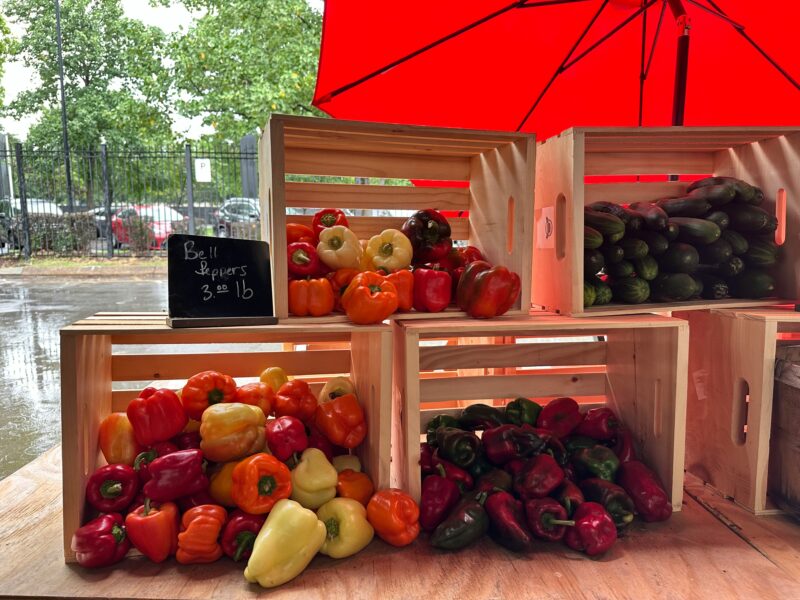Welcome to the heart of mindful eating – the organic kitchen, where flavor meets sustainability, and every bite is a conscious choice. Embrace the journey into the world of organic cooking, where wholesome ingredients transform into delightful dishes that nourish not only your body but also the planet.
Why choose organic?
Organic foods are cultivated without synthetic pesticides, herbicides, and genetically modified organisms (GMOs). The emphasis is on natural processes, fostering biodiversity and ensuring soil health. Growing organic food works in tandem with nature, not against it. According to a study in the Journal of Environmental Health Perspectives, choosing organic can reduce exposure to pesticides commonly found in conventionally grown produce.
There are hundreds of reasons to choose certified organic, including the health benefits that many studies connect to eating organic, which doesn’t contain the more than 700 chemicals used in conventional food production.
Studies link eating organic to a variety of beneficial health effects. Research from Friends of the Earth shows that switching to an organic diet decreases levels of cancer-causing glyphosate – the main ingredient in Bayer-Monsanto’s pesticide Roundup – by 70 percent in participants’ bodies in just one week.
There are numerous studies linking chemicals in conventional food production to health-related problems and diseases. One study found that exposure to fungicide, herbicide and insecticide cocktails can lead to DNA damage and elevated blood cell death. Pesticide exposure has also been associated with depression and the development of Parkinson’s disease.
Practical tips for an organic kitchen
Start with the basics
Begin your organic journey by adding staple ingredients such as organic fruits, vegetables, grains and legumes.
If you haven’t already made the swap to certified organic food products, we have many brand supporters with excellent products here. There is a healthy swap for every familiar conventional product you use. It’s a great time to commit to skipping the chemicals and choosing organic food instead.
Local and seasonal
Buying local organic food is the easiest way to create an organic nutrient-dense menu. One of the most important reasons to buy your organic locally is to lower the fossil fuel costs involved in transporting it. Most produce travels about 1,500 miles from farm to plate, and this long-distance, large-scale transportation of food consumes large quantities of fossil fuels – about 10 times the amount of energy derived from fossil fuels as the energy we get from the food itself, according to Cuesa.
When produce is shipped long distances, it loses some nutritional value. Eating locally and with the seasons is not only better for you but also the most effective way to save money on organic food and help offset the energy costs of transporting food out of season.
If you know your farmer, you know where your food comes from, and the best way to build a relationship with local, organic farmers is at a farmer’s market. You can find farm stands and farmers markets all around the country, offering fresh seasonal goodies at competitive prices. (Use this directory to locate both farms and farmer’s markets.)
Seasonal fruits and vegetables offer peak flavor and contribute to sustainable agricultural practices. If you’re curious about what is in season, find out more by consulting one of our seasonal guides:
It can be challenging to find organic produce in certain areas. To help, we’ve identified some organic produce delivery services:
Cleaning without chemicals
In addition to improving your diet, you can also upgrade your kitchen by using healthy cleaning products and tools.
Many home cleaning products are not regulated and contain dangerous chemicals. If you use a product with claims of being a disinfectant or antibacterial, it likely contains a pesticide or chemical of concern. Toxic cleaning products and air fresheners also add to poor indoor air quality. According to EWG, “inhalation of airborne particles is linked to coughs and respiratory irritation, as well as more serious long-term consequences, including lung disease and cancer.” Lastly, these chemicals don’t just harm us. They also get into our waterways and harm the environment and wildlife as well.
A healthy swap to freshen the air in your home is remove harmful chemical cleaners, invest in an air purifier and diffuse some essential oils. (Make sure to dispose of cleaners according to directions.) Find out more below about the organic and natural products we recommend .
Here are some other tips you can use to clean your home without harsh chemicals:
- One of our brand partners, Dr. Bronner’s, has an excellent multipurpose cleaner called Sal Suds, which can be used to clean dishes, floors, laundry and more. Dr. Bronner’s also received an A in EWG’s Guide to Healthy Cleaning.
- If you’re looking for a product that cuts down on the plastic waste concerns of store-bought cleaning products, try Branch Basics concentrate and refillable glass bottles. The company’s starter kit contains one solution that will take care of your laundry, dishes, floors, windows and even your bathrooms. Best of all, it works!
- Seventh Generation is also a great brand that gets top honors in many of EWG’s Green Cleaning Products categories.
- If you would like to create your own multipurpose cleaner, mix a half-cup of organic vinegar with 3 cups of filtered water and 6 drops of organic essential oil.
- You can also search EWG’s Top Green Cleaning Products to find the perfect match for all your cleaning needs.
Label literacy
Familiarize yourself with labels. The “USDA Organic” label ensures the product contains at least 95 percent organic ingredients. There are many labels; make sure you understand the differencs. The differences between the well-known Non-GMO Project verified “butterfly” label and the USDA Certified Organic seal can be confusing. Find out more about the differences between these two labels in this blog.
Delicious recipes for the organic kitchen
Explore these recipe roundups for inspiration and guidance.
- Organic smoothies
- Organic berry recipes
- Climate-friendly recipes
- Organic spring recipes
- Organic summer recipes
The future of sustainable eating
The Organic Kitchen is not just a culinary journey; it’s a commitment to a sustainable future. According to a report by the Rodale Institute, organic farming practices promote healthier soil, water and air, contributing to climate change mitigation.
By choosing organic, you participate in a movement that champions environmental conservation, supports local farmers and prioritizes your well-being. It’s a journey where every ingredient tells a story, and every meal is a step toward a healthier, more sustainable tomorrow. So let’s embark on this culinary adventure together – the organic kitchen awaits, where conscious choices and delectable flavors harmonize.









